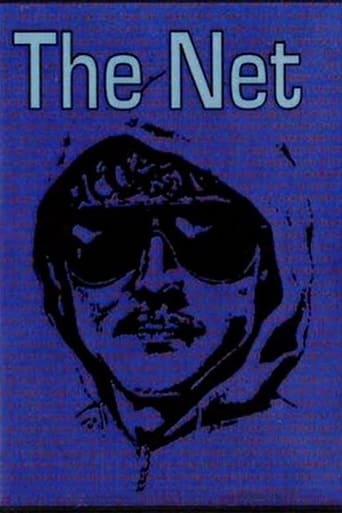



Sadly Over-hyped
Absolutely Fantastic
It’s fine. It's literally the definition of a fine movie. You’ve seen it before, you know every beat and outcome before the characters even do. Only question is how much escapism you’re looking for.
View MoreAfter playing with our expectations, this turns out to be a very different sort of film.
View MoreDespite some lofty dialog and cherry-picked quotes by everyone from Norbert Wiener to Wittgenstein, this documentary is a train wreck of thesis, exploration and conclusion.Let me summarize the entire film for you here so you do not have to view it: In an attempt to understand the evolution of computing and it's future impact on humanity (a noble endeavor), the director takes such a disjointed path that the audience can only draw this conclusion: Rather than joining the "Digerati", computer scientists or other profound government-related technology projects like his contemporaries at Harvard and Berkeley during the 1960's, Ted Kaczynski "may have" developed his anti-technology views and perspectives after being subjected to psychologically stressful mind-control experiments while a student at Harvard.There you go.There is certainly a conversation around cybernetics that needs to be had by society, but as it's pointed out emphatically and eloquently multiple times by those who helped orchestrate "the system", killing people to have this debate takes away any legitimacy or credibility Kaczynski had. And the Unabomber is the primary source of counter-argument which the director depends. These repeated encounters destroy the director's agenda (whatever it actually was).You can fear technology as Kaczynski did or as the director is trying to make you, or you can view it the way Stephen Hawking does: Humans, limited by slow biological evolution, will not be able to compete with machine evolution, and would/(will) be superseded. Hawking believes machines are the natural evolution of humanity and likely our only way to get off the short life of our earth and solar systems, and navigate the universe.I don't know what I think, but I'd rather not live in fear if possible. And fear of technology, while completely excusable (Ed Snowden, et. al.) is not presented with any effect in this film.And I still don't know what LSD had to do with the film's premise!
View MoreThere is no denying the facts uncovered by Mr. Dammbeck. If you are a student of the history of technology, of computing especially, and its relationship with society then this film is a must see.It raises questions which have never been addressed elsewhere. Indeed Mr. Dammbeck discloses that the biases are "systemic".For example, Why did "Silicon Valley" develop in California? Why is the University of California a beacon of BOTH computer science education, and the vanguard cultural movements in the 60s? How exactly were computers marketed to the public at first? In what context? How was the decision to disseminate the mass consumption of computation taken? (This is WAY beyond the "chicken and egg" problems of scope Guy Kawasaki faced with marketing Apple PCs to the public.) What are the Taboos underpinning our technological society? Who benefits from these taboos? What has Thom Friedman left out in his discussion of our presently Global, multi-ethnic society?This is a spare, lean philosophical exploration of things never or rarely discussed in the media, but it is extremely relevant to our present!A Must See, especially for engineering students.
View MoreThe Whole is greater than the sum of its parts; the System will survive a couple of loose parts and weak links. Arpanet, as the precursor to the Internet, was designed to withstand localized damage. The Global Economy, too, has survived the terrorism by Al-Qaeda as well as by the Unabomber. Likewise, this film, as a film ABOUT the Internet and the Global Economy, withstands the critiquing of its weaker attributes.The subject matter of this film is the Brave New World of technological utopia, a Mega-System of sorts. This story entails systematics, globalization, technological rationalization and the paranoid fantasies of this world's discontents. Human behaviour becomes a fabrication of control mechanisms, and in such a world nothing is feared more than a total lack of control, i.e. arbitrary terrorism, such as that of The Unabomber. The ingenuity of this film, on a purely intellectual level, is the way it connects the dots between The Internet, Esalen Institute, New York Times, M.I.T., Henry David Thoreau, Montana and Ted Kaczynski. In a word, this film weaves an intriguing Web about the Web.One shouldn't be put off by the problematic morals of this film. This film, as a document, is too important to be dismissed as sensationalism or misguided hero-worship. For one, Dammbeck puts Unabomber in a context where one is not made to agree with his radical (and borderline insane) ideas, but instead is given a good sample of the institutional background of the professor-turned-killer, forcing a transition from the merely personal and anecdotal into the realm of History and Causation. What, we are asked, is the relationship between fundamental mathematics and the paranoid fantasies of Gödel and Kaczynski? And what if there is a linkage between the CIA-Army behavioural experiments of the 1950's and 60's and the very real madness of Unabomber? What, after all is said and done, is the role of individual responsibility in a world governed by trends, fluctuations, computer technology and economic mergers? Lutz Dammbeck's documentary is a fascinating voyage into the dark underbelly of the American Dream (to paraphrase Hunter S. Thompson). The film maker slices through a number of interweaving threads in search of something intangible yet real, something to cut through the virtual. In fact, the film may be accused of being somewhat incoherent in its production, because the internal logic of the film follows too closely the subjective voyage of the director (with mind maps and internal dialogues given precedence to the voice of the interviewees). That said, subjectivity in documentary film-making can be a strength, and the director takes full advantage of the opening up of new doorways into strange, dark alleys of underreported American history. He is bounced around from door to door, from person to person, from topic to topic. The viewer is in for a roller coaster ride, both dazzling and dizzying.The film maker exhibits clear signs of ignorance, arrogance, confusion, banality and moral ambivalence - all in varying proportions. Still, the end result manages to be inclusive yet not over-effuse, and, for the viewer, the combinatory effect of topics and interviewees boils down to an altogether charming and fascinating experience. It is hard to say what lessons to learn from this film, but one is at least given a glimpse of the full compass of Genius on the moral scale from the Humanitarian to the Criminally Insane. It is less than comfortable to find out that the difference between a Benefactory Visionary and an Evil Genius is a thin red line...
View More"Das Netz" seemed like an interesting subject matter in the first glance, but the movie is fundamentally flawed by the fact that the author has no profound knowledge about the topic. He's giving obscure statements about the internet being "an agglomeration of machines with indefinite size and power" and his not even partial knowledge about mathematics (and especially Gödel's theories) are hilarious. The scenes in which the director is drawing the "big picture" are completely pointless and it's extremely rude to confront a victim of Kaczynsnki (who lost an arm in a bombing) with the statement that he'd been a victim of a legitimate fight against the "system".
View More